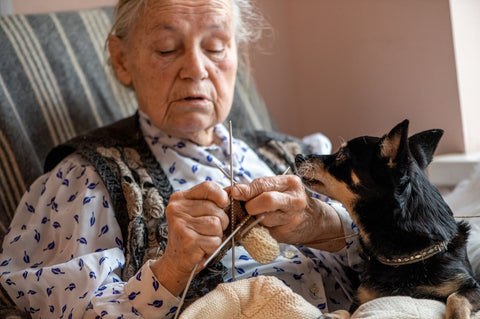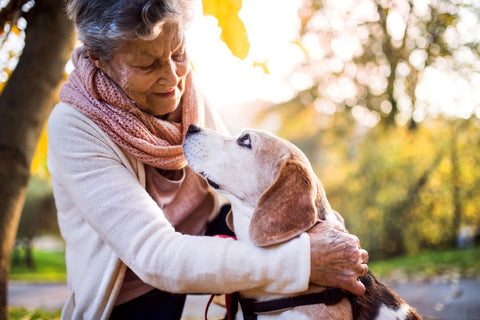Pets can be loyal companions that bring a great deal of joy and other benefits to their owners in later life. Studies indicate that owning pets can help improve general physical health, as well as mental health and combatting loneliness in the elderly.
In this article, we look at the benefits of pets for the elderly and also cover other considerations for older adults before taking on a pet.
Jump to:
- Pets and seniors: What are the benefits?
- The best types of pets for older adults
- Other considerations before getting a pet in later life
- Can elderly people get the benefits of a pet without the responsibility of owning one?
- Extra peace of mind when living independently in later life
Pets and seniors: What are the benefits?
There are many different potential benefits of owning a pet for older adults, including:
Providing companionship and combatting loneliness
Many people feel lonely from time to time, but for some elderly people especially, this can be something that doesn’t go away and can have lots of negative impacts on quality of life. They may have lost a spouse or long-term partner or friend, may have reduced mobility or medical conditions that keeps them at home more, or their circumstances may have changed, and they are now spending more time on their own than they used to. For some people, having a pet as a companion can really help with this. Pets offer unconditional love as well as companionship and can help to reduce feelings of isolation.
Providing a sense of purpose and instilling healthy routines
Caring for a pet can give older people a real sense of purpose and encourage the development of routines, which can be really helpful for some elderly adults. For example, having set times or windows in the day when a pet is usually fed, played with, exercised, brushed or stroked can help give structure to someone’s day and provide reasons for them to be more active and spend time outdoors.
Good for mental and emotional wellbeing
Spending time in the company of animals is known to help reduce stress, anxiety and in some cases can help to combat depression too, for people of any age. Interacting with pets can stimulate the release of endorphins, which can naturally help to improve mood and give a more positive outlook on things. Pets can also be very entertaining, making their owners laugh and bringing joy, comfort and emotional support.
Encouraging social interaction
It can be quite challenging for many older people to get regular social interactions, but having a pet can be a big help in this area. Walking a dog usually means meeting and chatting to other dog owners in parks or green spaces, which can help with the sense of community and feelings of belonging, as well as pets being a great way to break the ice and initiate conversations with strangers.
Even taking the pet for routine vet visits or grooming appointments can be a good source of social interactions too and can help new friendships to form in the local community.
Good for physical health
Walking a dog or playing with a cat regularly can be gentle activities that help older adults to maintain their mobility and improve general health and fitness over time. This can result in increased energy levels, improved heart health, be helpful for managing arthritis or some other joint conditions and help with building strength and stamina. It can also help to improve sleep for the elderly.
On top of these benefits, studies have also found that spending time with pets can lower blood pressure and cholesterol levels in some people, which can reduce the risks of stroke or heart disease.
Good for brain health
Looking after the needs of a pet means that older owners have to use their cognitive function for things such as remembering their pet’s mealtimes, any medications they might need, along with things such as brushing/grooming, vet appointments and more. This mental stimulation can have a similar impact as brain games for seniors, helping older adults to stay sharper and maintain cognitive health for longer.
The best types of pets for older adults
It’s very important for older people considering getting a pet that some thought is given to the right type of pet for the circumstances and lifestyle. Different types of pet need varying levels of care and the tasks involved can be more suited to some people than others. For example:
- Dogs need regular exercise, training and should only be left alone for a few hours at a time
- Cats tend to have fewer care needs than dogs, but may still require someone to manage their litter tray, health needs and provide meals and affection
- Birds and small animals like rabbits or guinea pigs need lots of space to be happy, usually need to live in single-sex pairs or groups and their living space needs to be cleaned out regularly.
Younger pets can have considerably more care needs than those that are already adults, so when elderly people are considering a pet, adopting an adult one might be a better option. For example, toilet training and managing the endless energy of a young puppy, along with meeting their socialisation and other training needs through puppyhood and adolescence, can be quite an undertaking. On similar lines, kittens can be high-energy and mischievous, and can be quite destructive in the home. Many animal rescue centres are always on the lookout for older adopters who can offer a quiet and secure forever home to the adult pets in their care.

Other considerations before getting a pet in later life
Along with the type of pet most suited to an individual person in later life, there are other considerations too, including:
The costs of caring for a pet
There are plenty of costs that need to be factored into looking after a pet, such as:
- Food
- One-off supplies, such as bowls, beds, collars, toys
- Repeated supplies, such as bedding for small animals, treats or things to chew etc
- Grooming costs if the pet requires professional grooming
- Routine vet treatment, such as vaccinations, flea and worming treatments, neutering or dental treatment.
If a pet has an accident or falls ill, unexpected vet bills can quite quickly stack up. Many owners choose to take out pet insurance to help cover the cost of any big, unexpected vet bills, but there are always exclusions to the cover, so it’s important to understand exactly what will and won’t be covered by an individual policy before buying it.
Pets that develop chronic conditions that might need long-term treatment or medication from the vets to manage this should also be a consideration, as taking out a new insurance policy with a different provider usually means that any already-diagnosed conditions will not be covered.
Most vets require payment for treatment as soon as it is given, and insurance claims can take some time to go through, so having access to funds in an emergency is something else to consider.
Some vet organisations, such as the PDSA, offer discounted vet treatment for eligible owners and pets.
The practicalities of caring for a pet when you are elderly
Having the responsibility of caring for a pet is something that might not be suitable for every older adult and their lifestyle, so it’s important to consider this before committing to pet ownership. For example:
- Older people with mobility issues may find it challenging to look after or clean up after their pet if they struggle with bending down to the floor and rising again
- Pet equipment in the home could be a potential trip hazard for some older people if not managed and arranged carefully
- If the pet is a dog, consider its specific exercise needs, training requirements and energy levels as to whether it’s the best choice in pet for this individual as a companion
- Older people who may be experiencing changes to their vision or hearing loss might benefit most from a specific type of pet over another to help keep everyone safe and happy.
What will happen to your pet if you become unable to look after it in later life?
For older people taking on a pet, it may be possible that the pet will outlive the owner, or need additional care if the owner’s health or circumstances change and they can no longer offer the care needed to the pet.
In some cases, the owner may need to have an extended stay in hospital or even need to enter a care home, so it’s important that there is a plan in place for the pet in this instance.
Some care homes or supported living settings for the elderly do cater for pets to come in with their owners, but this tends to be the exception rather than the rule.
There are also various charities and organisations that might be able to help, usually with no charge, including:
- The Cinnamon Trust, with their pet profiling scheme
- The Dog’s Trust, with their canine care card scheme
- The RSPCA, with their home for life scheme
- The Blue Cross, with their pets into care scheme.
If the older person originally adopted their pet from a reputable rescue organisation, there is usually a requirement in the adoption contract that the pet is returned to the rescue in the event that the owner is no longer able to care for them.
For older pet owners still living at home but perhaps needing some extra care for their pet that they can no longer provide themselves, professional pet sitters or dog walkers might be available to provide this as part of their business, along with family, friends or neighbours who might want, and be able, to help out.
Can elderly people get the benefits of a pet without the responsibility of owning one?
If an older person would love to have regular interaction with a pet but doesn’t feel able to take on the responsibility of owning one, there are some opportunities that might be ideal. These include:
Fostering for a local rescue organisation

Many local animal rescues use foster homes for the pets in their care while they are waiting for a new home. This means that the pet is in a home environment while waiting for their forever home and the rescue will usually pay all associated costs for things like food and vet treatment, so the fosterer doesn’t have to cover these while looking after the pet.
Contact local rescues in your area to find out if there are opportunities for fostering and what the requirements are.
Pet minding for family, friends or neighbours
An informal arrangement to help look after the pet of a family member, friend or neighbour can be a great way for an older person to spend quality time with a pet and get many of the benefits, but without the responsibility of ownership. For example, spending time with a neighbour’s dog while the owners are at work, or looking after someone’s cat while they are on holiday.
It should be noted that taking payment for looking after someone else’s pets in your own home usually requires a licence from the local authority.
Extra peace of mind in later life
Those who live independently in later life can sometimes worry that they won’t be able to reach help if they have a fall or an accident, especially if they live alone. Or, perhaps they are very active and enjoy taking their dog on long walks, but are concerned that something could potentially happen when they are out and about.
One solution that could potentially help bring real peace of mind to everyone could be a personal alarm system, which is a pendant, personal alarm watch or fob that is worn at all times. With just a single press of the button, which is monitored 24/7, help can be reached if it’s needed.
There are alarms that are designed for the home and garden and also personal alarm systems that work anywhere in the UK and track the wearer’s location, so are ideal for taking along on the daily dog walk.
If you want to speak to our team to find out which personal alarm system would be best suited to your circumstances, you can call our friendly team on 0800 085 7371 or you can browse all of our alarms online.



